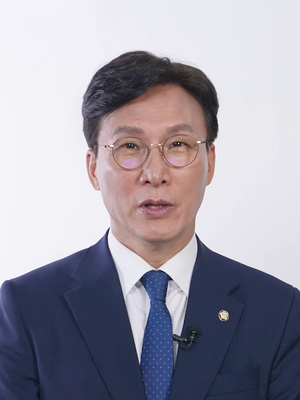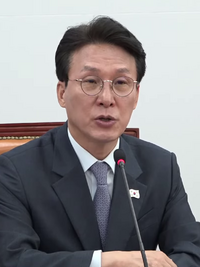Kim Min-seok (politician) facts for kids
Quick facts for kids
Kim Min-seok
|
|
|---|---|
|
김민석
|
|

Kim in 2024
|
|
| Prime Minister of South Korea | |
| Assumed office 7 July 2025 |
|
| President | Lee Jae Myung |
| Preceded by | Han Duck-soo Lee Ju-ho (acting) |
| Leader of the Democratic Party | |
| In office 30 January 2016 – 31 October 2016 Serving with Park Joon-young until 14 March 2016 |
|
| Preceded by | Kang Shin-sung |
| Succeeded by | Position abolished |
| Member of the National Assembly for Yeongdeungpo B | |
| Assumed office 30 May 2020 |
|
| Preceded by | Sin Kyŏng-min |
| In office 30 May 1996 – 27 May 2002 |
|
| Preceded by | Rha Woong-bae |
| Succeeded by | Kwon Yeong-se |
| Personal details | |
| Born | 29 May 1964 Yeongdeungpo, Seoul, South Korea |
| Political party | Democratic (since 2016) |
| Other political affiliations |
See list
Little Democrats (1990–1991)
Democratic (1991–1995) NCNP (1995–2000) MDP (2000–2002; 2003–2005) Democratic (2005–2007) UNDP (2007–2008) UDP (2008) Democratic (2008–2010) Democratic (K) (2014–2016) |
| Spouses |
Kim Ja-young
(m. 1993; div. 2014)Lee Tae-rin
(m. 2019) |
| Children | 2 |
| Education | Seoul National University (BA) Harvard University (MPA) Tsinghua University (JM) Rutgers University–Newark (JD) |
| Korean name | |
| Hangul |
김민석
|
| Hanja |
金民錫
|
| RR | Gim Minseok |
| MR | Kim Minsŏk |
Kim Min-seok (Korean: 김민석, born in 1964) is a South Korean politician and former activist. He has served as the Prime Minister of South Korea since July 2025. He is a member of the Democratic Party of Korea (DPK).
Kim has also been a member of the National Assembly for Yeongdeungpo B. He served from 1996 to 2002 and again since 2020. Born in Seoul, he studied at several universities, including Seoul National University and Harvard University. He was once detained for a protest at the American Culture Centre in Seoul.
He was first elected to the National Assembly in 1996. He was seen as a rising star in the Democratic Party. However, he lost the Seoul mayoral election in 2002. This led to a decrease in his popularity. Kim made a political comeback when he was elected to the National Assembly again in 2020. This marked his return after 18 years. He is currently an advisor to President Lee Jae-myung.
Contents
Early Life and Education
Kim Min-seok was born in Seoul in 1964. He was the youngest of three children. His parents were Kim Joo-wan and Kim Choon-ok. His oldest brother, Kim Min-woong, is a pastor in the United States. His second brother, Kim Min-hwa, passed away in 1987.
Kim attended Soongsil High School. He later studied sociology at Seoul National University. In 1985, Kim Min-seok became the President of the Student Council at his university. He was later sentenced to jail for leading a protest at the American Culture Centre in Seoul. He was released in 1988 after being pardoned by President Roh Tae-woo.
After his detention, his mother, Kim Choon-ok, started a pro-democracy group. This group was called the Council for the Movement of Families for the Fulfillment of Democracy. Kim Min-seok also became close to Kim Dae-jung, who later became the country's president. Kim earned a degree from Tsinghua University in China in 2010.
Starting His Political Journey (1990–1995)
Kim began his political career in 1990. He joined the Democratic Party, also known as the Little Democrats. This party was led by Lee Ki-taek. Later, his party merged with Kim Dae-jung's party. They formed the Democratic Party in 1991.
Before the 1992 election, Kim was chosen to run for the Yeongdeungpo 2nd area. He ran against Rha Woong-bae, a former Deputy Prime Minister. Kim lost by a very small number of votes.
After this defeat, Kim moved to the United States. He studied for a Master's degree in Public Administration at Harvard University. He returned to South Korea before the 1995 local elections. He helped his party's candidate, Cho Soon, win the election for Mayor of Seoul. Kim helped attract young voters.
Serving in the National Assembly (1996–2002)
In the 1996 election, Kim ran for the National Congress for New Politics (NCNP) in Yeongdeungpo 2nd. He ran against Choi Young-han, a famous actor. Kim won the election. At 32 years old, he was the youngest member of the National Assembly. He also received the most votes among opposition candidates in Seoul.
He became well-known during a hearing about the Hanbo Group in 1997. This scandal involved corruption cases. Even though he couldn't get answers from the CEO, Kim showed that the CEO's statements were not true. Because of this, people called him "The Hearing Star."
In 1999, the NCNP was becoming the Millennium Democratic Party (MDP). Kim helped prepare for this change. He also started his own group called Youth Korea. This group aimed to gain more support. In October 1999, Asiaweek magazine named him one of the "20 Asian Youth Leaders of the Millennium." In January 2000, the World Economic Forum (WEF) chose him as one of the "100 Global Leaders in 2000."
Kim was re-elected in the 2000 election. However, his party did not win a majority of seats.
Seoul Mayoral Election in 2002
Before the 2002 presidential election, Kim was a very popular candidate within his party. He decided to run for Mayor of Seoul instead. He was not old enough to run for president at that time. Presidential candidates had to be at least 40 years old, and he was 38.
For the 2002 local election, Kim was chosen as his party's candidate for Mayor of Seoul. He won the party's internal selection with 52.1% of the votes.
He used slogans like "The new era needs a new leader." He promised to make Seoul more eco-friendly. This included using natural gas buses and controlling air pollution.
Kim ran against Lee Myung-bak from the GNP. Lee Myung-bak later became President. Despite an early lead, polls showed the race was very close. On June 13, Kim received 43.02% of the votes and lost to Lee, who received 52.28%. Kim had resigned from his National Assembly seat to run for mayor. His old seat was then won by a GNP candidate.
In October 2002, Kim left his party. He joined a group that supported a different presidential candidate. This decision was criticized by many. Because of this, some people called him a "migratory bird." This term refers to politicians who change their minds or parties often. Kim later said he regretted this decision.
Challenges in His Political Path
After the 2002 election, Kim's political career faced difficulties. In the 2004 election, he tried to return to the National Assembly. However, his party's support had dropped, and he lost. He also faced legal issues that prevented him from participating in politics for a few years.
In 2014, Kim became a consultant for a new party called the Democratic Party. In January 2016, he was elected as a co-President of the party. For the 2016 election, he was second on his party's list. However, he was not elected because the party did not get enough votes. In September, his party merged with the Democratic Party of Korea (DPK).
Return to the National Assembly (2020–2025)
On January 16, 2020, Kim announced he would run for the Yeongdeungpo 2nd seat again in the 2020 election. He said he wanted to restart his career from his home area. He won his party's selection, defeating the current member, Sin Kyŏng-min.
During his campaign, Kim used the slogan, "Make Yeongdeungpo as Ildeungpo." Ildeung means "1st place" in Korean. He promised to restore a local stream, similar to a project done by Lee Myung-bak years ago.
On election day, exit polls showed Kim was behind. However, the official results showed that Kim received 50.2% of the votes. He defeated his opponent with a majority of 5.9%.
Becoming Prime Minister (2025–present)
 |
|
|
Premiership of Kim Min-seok
|
|
|---|---|
| 3 July 2025 – present | |
| President | Lee Jae Myung |
| Cabinet | Full list |
| Party | Democratic |
| Seat | Sejong City |
 |
|
After Lee Jae-myung was elected President of South Korea in 2025, Kim was chosen to be the Prime Minister of South Korea. His selection needed approval from the South Korean National Assembly. His confirmation hearing in parliament began on June 24, 2025. The National Assembly approved Kim's nomination on July 3, 2025. The vote was 173-3, with the opposition party boycotting.
On July 7, 2025, Kim officially became Prime Minister. In his inauguration speech, he said he would "become a chief aide" to the President. He promised to "usher in a new era for the great Republic of Korea."
Personal Life
Kim Min-seok was first married to Kim Ja-young. She was a newsreader. They met in 1992 and married on March 6, 1993. They had a son and a daughter. They divorced in December 2014.
On November 24, 2019, Kim announced on his Facebook that he would remarry. He married Lee Tae-rin on December 12, 2019, at Shinghil Church.
Election Results
General Elections
| Year | Constituency | Political party | Votes (%) | Remarks |
|---|---|---|---|---|
| 1992 | Yeongdeungpo 2nd | Democratic | 48,151 (40.95%) | Defeated |
| 1996 | Yeongdeungpo 2nd | NCNP | 49,657 (48.87%) | Won |
| 2000 | Yeongdeungpo 2nd | MDP | 50,438 (60.39%) | Won |
| 2004 | Yeongdeungpo 1st | MDP | 21,033 (20.88%) | Defeated |
| 2016 | PR (2nd) | Democratic (K) | 209,872 (0.88%) | Not elected |
| 2020 | Yeongdeungpo 2nd | Democratic | 47,075 (50.20%) | Won |
| 2024 | Yeongdeungpo 2nd | Democratic | 49,651 (50.18%) | Won |
Local Elections
Mayor of Seoul
| Year | Political party | Votes (%) | Remarks |
|---|---|---|---|
| 2002 | MDP | 1,496,754 (43.02%) | Defeated |
See also
 In Spanish: Kim Min-seok para niños
In Spanish: Kim Min-seok para niños
 | William M. Jackson |
 | Juan E. Gilbert |
 | Neil deGrasse Tyson |

